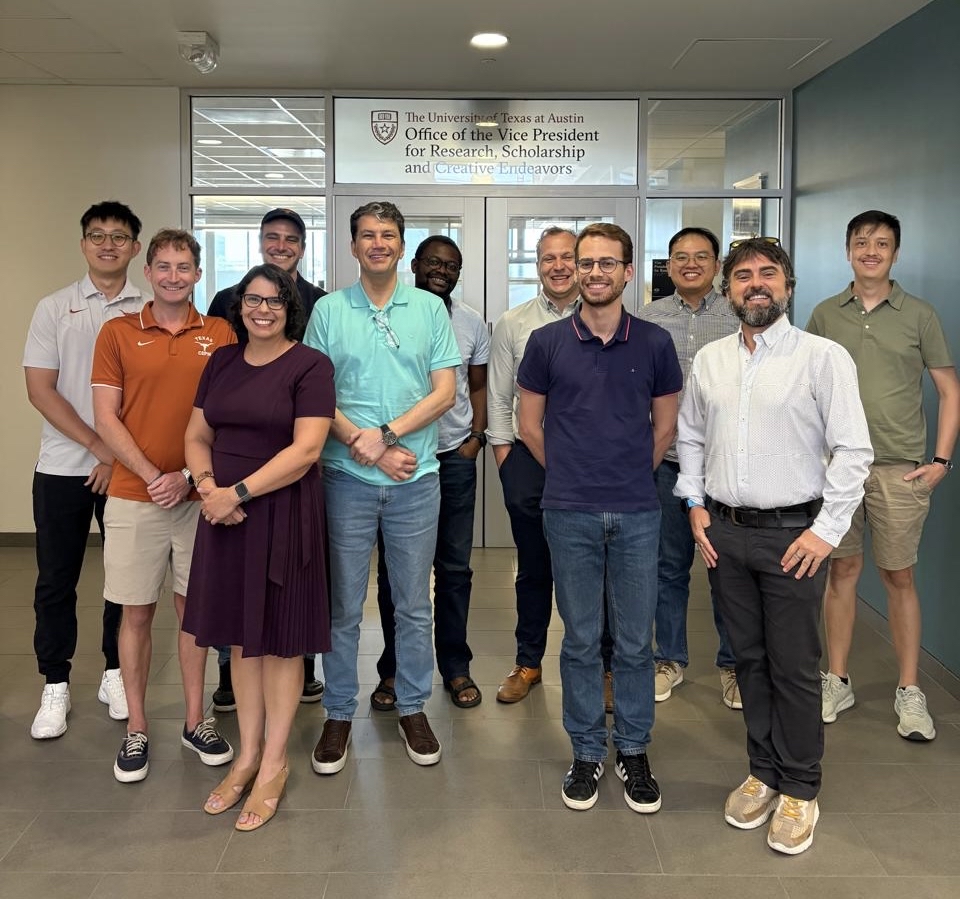Brazil Resilience and Disaster Response and SETx-UIFL Research Exchange

Some of the participants of the research exchange
The Southeast Texas Urban Integrated Field Laboratory (SETx-UIFL) recently hosted a full-day research exchange with distinguished researchers from Brazil’s Federal University of Rio Grande do Sul (UFRGS) that exemplified the power of international partnerships in addressing resilience challenges. This event, part of a broader campus visit facilitated by Professor Fernanda Leite, UT Austin’s Interim Vice President for Research and SETx CoPI, brought together expertise from two continents and demonstrated the institutional commitment to international scientific cooperation. This partnership emerged from shared challenges both regions face: compound environmental hazards affecting vulnerable communities, aging infrastructure systems, and the need for community-engaged solutions.
Building Bridges Across Continents
The collaboration centered on developing resilience strategies for critical infrastructure in the face of environmental change, drawing from learning opportunities that span Brazil, and the United States. Professor Tarcisio Abreu Saurin from UFRGS’s Industrial Engineering Department led the Brazilian delegation alongside PhD student Guilherme Luiz Canzian Marion, who specializes in construction and infrastructure resilience.
The timing proved particularly relevant, as Brazil continues recovery efforts from the devastating 2024 floods that affected 2.4 million people and caused 183 casualties, while Texas grapples with the impacts from last July flooding events, and persistent air quality challenges from industrial activities.
Research Themes and Collaborative Focus
The visit encompassed four major research themes that reflect SETx-UIFL’s interdisciplinary approach to urban resilience.
Water and Flood Resilience
Researchers shared advanced hydrological modeling techniques and community-based flood management strategies. The Brazilian team brought insights from their recent flood response experience, while Texas researchers presented innovations in compound flooding scenarios and storm transposition techniques.
Climate Adaptation
Teams focused on high-resolution climate projections and extreme weather impact analysis, exploring how different geographic contexts require tailored approaches to urban heat island mitigation and temperature-related health impacts.
Air Quality
Given Southeast Texas’s industrial landscape and Brazil’s urban air pollution experience, researchers shared methodologies for monitoring industrial emissions and analyzing indoor-outdoor air pollution interactions. The Brazilian team showed particular interest in the PTR-ToF MS instruments for real-time analysis of up to 500 compounds.
Social Vulnerability and Health
The collaboration explored approaches to measuring social vulnerability, from quantitative indices to qualitative community engagement strategies, recognizing that effective resilience planning must address both technical and social dimensions of risk.
Research Presentations and Knowledge Exchange
The event featured research presentations showcasing SETx-UIFL’s work within the Department of Energy’s Urban Integrated Field Labs initiative, which addresses compound impacts of flooding and air pollution on underserved communities in Southeast Texas.
SETx-UIFL Project Overview
Paola Passalacqua, the program lead, provided a comprehensive introduction to the SETx-UIFL project, detailing the Department of Energy initiative that in our program brings together four Texas institutions and two national labs. Her presentation outlined the project’s focus on compound impacts of flooding and air pollution on marginalized communities in Southeast Texas, emphasizing the collaborative nature of the research and the importance of community engagement in developing effective adaptation strategies.
Climate Science and Atmospheric Research
Professor Geeta Persad presented climate theme work, focusing on high-resolution climate data sets and projections for Southeast Texas. Her team has developed downscaling techniques that transform global climate models into locally relevant information, including innovative approaches to hurricane projections and storm transposition methods.
Advanced Air Quality Research
Professor Kerry Kinney demonstrated air quality research in the Beaumont-Port Arthur region, featuring mobile monitoring platforms and management of 40 terabytes of “sniffer” sensor data. Her work with PTR-ToF MS instruments provided the Brazilian team insights into scalable environmental monitoring approaches.
Student Research Showcase
The event featured comprehensive student and post-doc presentations highlighting the next generation of resilience research across multiple themes.
Disaster Response and Infrastructure Resilience
Presentations included Sean Murphy’s research on coastal community resilience maturity, presenting frameworks for categorizing communities based on their resilience plans and long-term improvement strategies. Guilherme Luiz Canzian Marion from the Brazilian delegation contributed perspectives on construction and infrastructure resilience approaches.
Flood Management and Climate Modeling
Sessions featured Mark Wang’s flood inundation mapping in Southeast Texas using compound flood scenarios and terrain analysis techniques to provide neighborhood-scale flood information, while Linchao Luo and Emmanuel Pozzer presented complementary work on hydrological modeling and climate data applications. Chih-Shen Chen discussed digital twin applications for flood management decision-making. Ifeanyichukwu C. Nduka explained the process of downscaling climate data for Southeast Texas, using a statistical downscaling method called pre-dial to preserve trends and add local information, selecting the best 10 models from 35 available models and focusing on temperature, precipitation, and solar radiation with emphasis on heat stress impacts.
Air Quality and Environmental Monitoring
Research was presented by Sam Lin on indoor-outdoor air pollution interactions, particularly the impact of acute outdoor emission events on indoor air quality and ventilation rates. Evelyn Deveraux presented her work on mobile measurements in the Beaumont-Port Arthur area, showcasing field-based approaches to environmental monitoring in industrial settings.
Brazilian Resilience Engineering Perspectives
Professor Saurin presented resilience engineering principles and their application to the 2024 Brazilian floods. His framework for understanding resilience as a system’s ability to adapt to changes resonated with the Texas team’s community-engaged approach.
Community Engagement and Methodological Innovation
Both Brazilian and Texas teams emphasized participatory approaches that value local knowledge and ensure community voices shape research priorities. The collaboration highlighted methodological approaches that bridge technical expertise with community-centered research design.
The Texas team shared their experience with community task forces including grassroots organizations and technical stakeholders, while the Brazilian team brought perspectives on stakeholder engagement during crisis response from their 2024 flood response experience. This exchange highlighted how different cultural contexts require adapted approaches while maintaining core principles.
Knowledge Management Platform Development
Will Mobley showcased the project’s knowledge management platform (KMP) that facilitates data access and integration across interdisciplinary teams. The platform manages massive environmental datasets while making them accessible to researchers and community stakeholders through standardized workflows and AI-powered integration of structured scientific data with unstructured community input.
Social Vulnerability Research
Professor Michelle Annette Meyer presented the Social Vulnerability team’s work on developing locally calibrated social vulnerability indices. Her research combines quantitative analysis with community engagement, highlighting the importance of community feedback in adapting vulnerability measures to local contexts.
Future Collaboration and Lasting Impact
The research exchange established foundations for ongoing collaboration between Brazilian and Texas research teams. The event demonstrated opportunities for student and faculty exchanges, shared methodological development in resilience engineering frameworks, and comparative case studies that can illuminate universal principles while respecting local contexts.
Both teams recognized the value of cross-cultural learning in climate resilience research, particularly the integration of different approaches to community engagement and stakeholder participation during crisis response. The day’s presentations highlighted how international collaboration addresses climate challenges that transcend national boundaries, bringing together complementary expertise in resilience engineering, climate modeling, air quality monitoring, and social vulnerability assessment.
Mind map of the event
UT Austin & UFRGS
International Collaboration
UT Austin faculty & students
International collaboration
Climate Adaptation
Air Quality & Health
Social Vulnerability
Geeta Persad
Kerry Kinney
Tarcisio Abreu Saurin
Climate modeling
Disaster response
Air quality monitoring
Knowledge management
Social vulnerability
Methodological innovation
40TB sensor data
Climate downscaling
AI integration
Resilience engineering
Infrastructure adaptation
Crisis coordination
Methodological development
Student exchanges
Global collaboration
